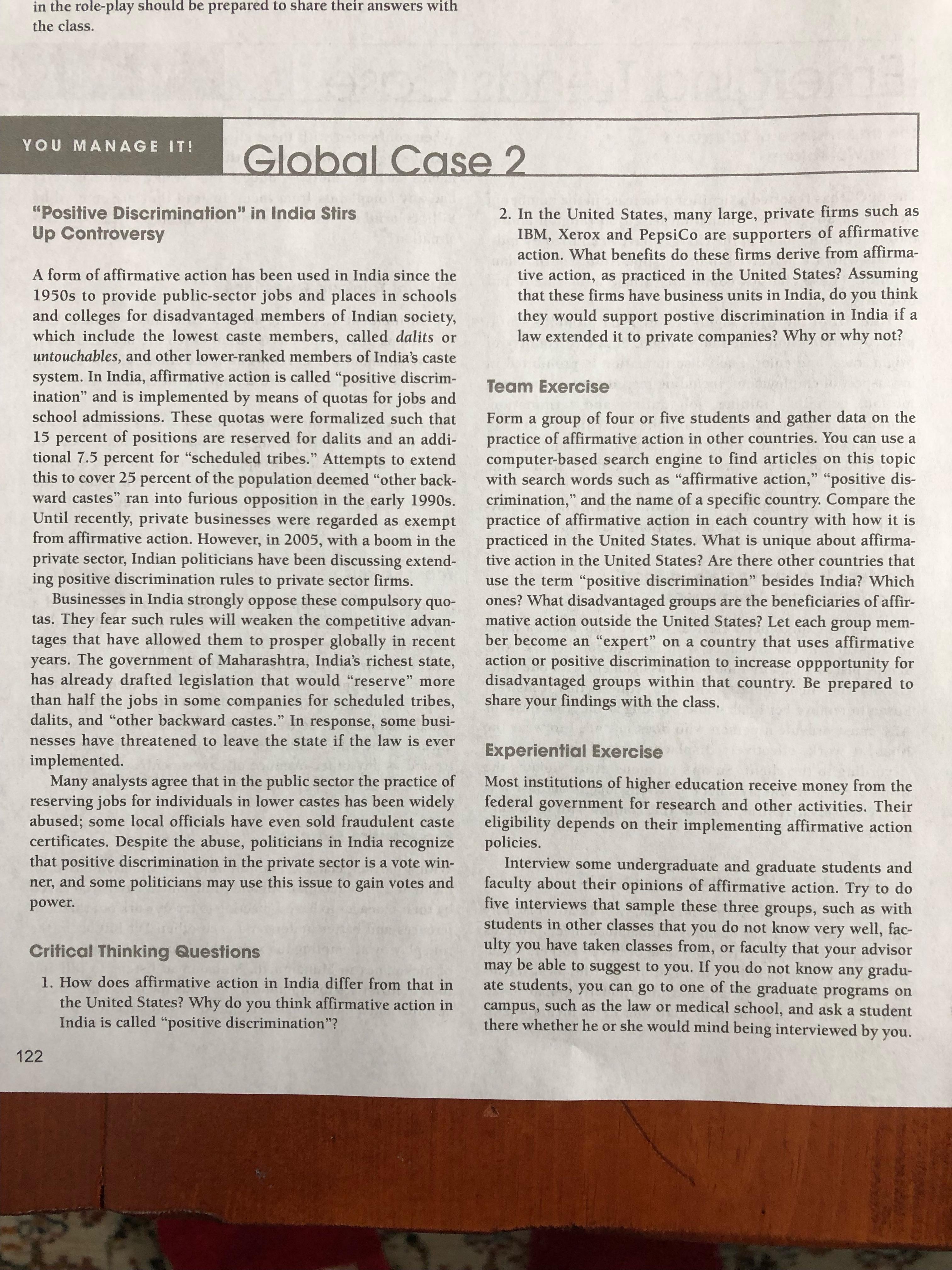Answered step by step
Verified Expert Solution
Question
1 Approved Answer
How does affirmative action in India differ from the use of affirmative action in the U.S.? Why do you think affirmative action in India is
How does affirmative action in India differ from the use of affirmative action in the U.S.? Why do you think affirmative action in India is called positive discrimination?
in the role-play should be prepared to share their answers with the class. YOU MANAGE IT! Global Case 2 2. In the United States, many large, private firms such as IBM, Xerox and PepsiCo are supporters of affirmative action. What benefits do these firms derive from affirma- "Positive Discrimination" in India Stirs Up Controversy tive action, as practiced in the United States? Assuming that these firms have business units in India, do you think they would support postive discrimination in India if a law extended it to private companies? Why or why not? A form of affirmative action has been used in India since the 1950s to provide public-sector jobs and places in schools and colleges for disadvantaged members of Indian society, which include the lowest caste members, called dalits or untouchables, and other lower-ranked members of India's caste system. In India, affirmative action is called "positive discrim- ination" and is implemented by means of quotas for jobs and school admissions. These quotas were formalized such that 15 percent of positions are reserved for dalits and an addi- tional 7.5 percent for "scheduled tribes." Attempts to extend this to cover 25 percent of the population deemed "other back- ward castes" ran into furious opposition in the early 1990s. Until recently, private businesses were regarded as exempt from affirmative action. However, in 2005, with a boom in the Team Exercise Form a group of four or five students and gather data on the practice of affirmative action in other countries. You can use a computer-based search engine to find articles on this topic with search words such as "affirmative action," "positive dis- crimination," and the name of a specific country. Compare the practice of affirmative action in each country with how it is practiced in the United States. What is unique about affirma- tive action in the United States? Are there other countries that private sector, Indian politicians have been discussing extend- ing positive discrimination rules to private sector firms. Businesses in India strongly oppose these compulsory quo- tas. They fear such rules will weaken the competitive advan- tages that have allowed them to prosper globally in recent years. The government of Maharashtra, India's richest state, has already drafted legislation that would "reserve" more than half the jobs in some companies for scheduled tribes, dalits, and "other backward castes." In response, some busi- use the term "positive discrimination" besides India? Which ones? What disadvantaged groups are the beneficiaries of affir- mative action outside the United States? Let each group mem- ber become an "expert" on a country that uses affirmative action or positive discrimination to increase oppportunity for disadvantaged groups within that country. Be prepared to share your findings with the class. nesses have threatened to leave the state if the law is ever Experiential Exercise implemented. Many analysts agree that in the public sector the practice of reserving jobs for individuals in lower castes has been widely abused; some local officials have even sold fraudulent caste certificates. Despite the abuse, politicians in India recognize that positive discrimination in the private sector is a vote win- ner, and some politicians may use this issue to gain votes and Most institutions of higher education receive money from the federal government for research and other activities. Their eligibility depends on their implementing affirmative action policies. Interview some undergraduate and graduate students and faculty about their opinions of affirmative action. Try to do five interviews that sample these three groups, such as with students in other classes that you do not know very well, fac- ulty you have taken classes from, or faculty that be able to suggest to you. power. Critical Thinking Questions your advisor If do not know any gradu- may ate students, you can go to one of the graduate programs on campus, such as the law or medical school, and ask a student there whether he or she would mind being interviewed by you. you 1. How does affirmative action in India differ from that in the United States? Why do you think affirmative action in India is called "positive discrimination"? 122
Step by Step Solution
★★★★★
3.44 Rating (157 Votes )
There are 3 Steps involved in it
Step: 1
Aff irm ative action policies in the U S are often criticized for discriminating a...
Get Instant Access to Expert-Tailored Solutions
See step-by-step solutions with expert insights and AI powered tools for academic success
Step: 2

Step: 3

Ace Your Homework with AI
Get the answers you need in no time with our AI-driven, step-by-step assistance
Get Started


